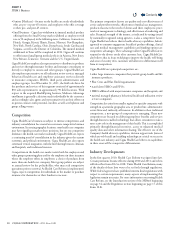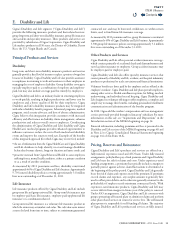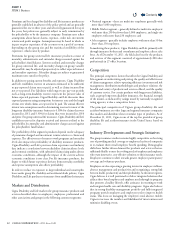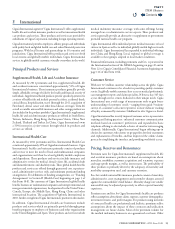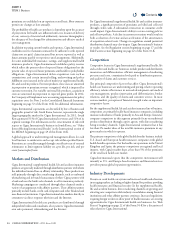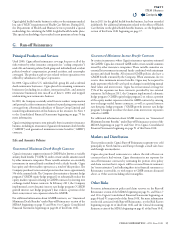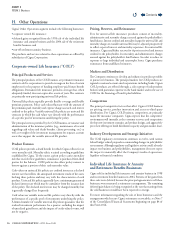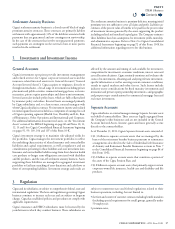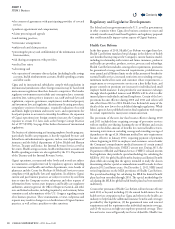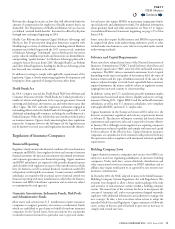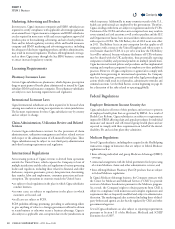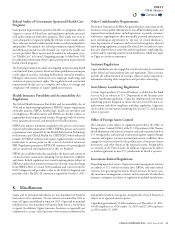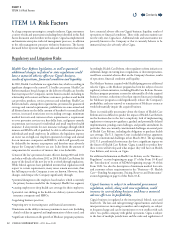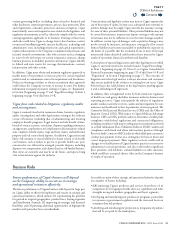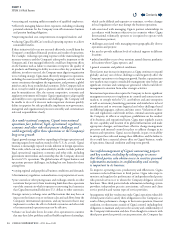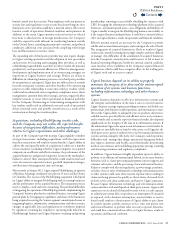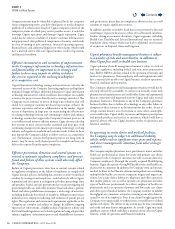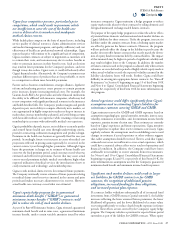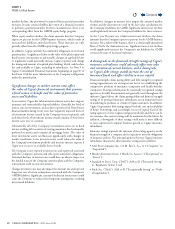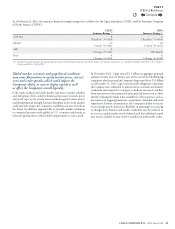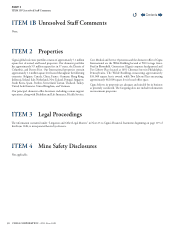Cigna 2011 Annual Report Download - page 42
Download and view the complete annual report
Please find page 42 of the 2011 Cigna annual report below. You can navigate through the pages in the report by either clicking on the pages listed below, or by using the keyword search tool below to find specific information within the annual report.
20 CIGNA CORPORATION2011 Form10K
PARTI
ITEM 1 Business
Marketing, Advertising and Products
In most states, Cigna’s insurance companies and HMO subsidiaries are
required to certify compliance with applicable advertising regulations
on an annual basis. Cigna’s insurance companies and HMO subsidiaries
are also required in most states to le and secure regulatory approval of
products prior to the marketing, advertising, and sale of such products.
State and/or federal regulatory scrutiny of life and health insurance
company and HMO marketing and advertising practices, including
the adequacy of disclosure regarding products and their administration,
may result in increased regulation. Products oering limited coverage,
such as those Cigna issues through the Star HRG business, continue
to attract increased regulatory scrutiny.
Licensing Requirements
Pharmacy Licensure Laws
Certain Cigna subsidiaries are pharmacies, which dispense prescription
drugs to participants of benet plans administered or insured by Cigna
subsidiary HMOs and insurance companies. ese pharmacy-subsidiaries
are subject to state licensing requirements and regulation.
International Licensure Laws
Cigna International subsidiaries are often required to be licensed when
entering new markets or starting new operations in certain jurisdictions.
e licensure requirements for these Cigna subsidiaries vary by country
and are subject to change.
Claim Administration, Utilization Review and Related
Services
Certain Cigna subsidiaries contract for the provision of claim
administration, utilization management and other related services
with respect to the administration of self-insured benet plans. ese
Cigna subsidiaries may be subject to state third-party administration
and other licensing requirements and regulation.
International Regulations
An increasing portion of Cigna’s revenue is derived from operations
outside the UnitedStates, which exposes the Company to laws of
multiple jurisdictions and the rules and regulations of various governing
bodies and regulators, including those related to nancial and other
disclosures, corporate governance, privacy, data protection, data mining,
data transfer, labor and employment, consumer protection and anti-
corruption. e operations in countries outside the UnitedStates:
•
are subject to local regulations in the place in which Cigna subsidiaries
conduct business,
•
in some cases, are subject to regulations in the places in which
customers are located, and
•in all cases are subject to FCPA.
FCPA prohibits oering, promising, providing or authorizing others
to give anything of value to a foreign government ocial to obtain
or retain business or otherwise secure a business advantage. Cigna is
also subject to applicable anti-corruption laws in the jurisdictions in
which it operates. Additionally, in many countries outside of the U.S.,
health care professionals are employed by the government. erefore,
Cigna’s dealings with them are subject to regulation under the FCPA.
Violations of the FCPA and other anti-corruption laws may result in
severe criminal and civil sanctions as well as other penalties and the SEC
and Department of Justice have increased their enforcement activities
with respect to FCPA. e UK Bribery Act of 2010 went into eect
in 2011. e Bribery Act is an anti-corruption law that applies to all
companies with a nexus to the United Kingdom and whose scope is
even broader than the FCPA. It is yet to be seen how the UK Bribery
Act will be enforced, but any voluntary disclosures of FCPA violations
may be shared with the UK authorities, thus potentially exposing
companies to liability and potential penalties in multiple jurisdictions.
Cigna has internal control policies and procedures and has implemented
training and compliance programs for its employees to deter prohibited
practices. However, if Cigna’s employees or agents fail to comply with
applicable laws governing its international operations, the Company
may face investigations, prosecutions and other legal proceedings and
actions which could result in civil penalties, administrative remedies and
criminal sanctions. See the Risk Factors section beginning on page22
for a discussion of the risks related to operating globally.
Federal Regulations
Employee Retirement Income Security Act
Cigna subsidiaries sell most of their products and services to sponsors
of employee benet plans that are governed by ERISA. As a result of
Health Care Reform, Cigna subsidiaries are subject to requirements
imposed by ERISA aecting claim and appeals procedures for individual
insurance and insured and self-insured group health plans and are
expected to comply with these requirements on behalf of the dental,
disability, life and accident plans they administer.
Medicare Regulations
Several Cigna subsidiaries, including those acquired in the HealthSpring
transaction, engage in businesses that are subject to federal Medicare
regulations such as:
•
those oering individual and group Medicare Advantage (HMO)
coverage;
•
contractual arrangements with the federal government for the processing
of certain Medicare claims and other administrative services; and
•
those oering Medicare Pharmacy (PartD) products that are subject
to federal Medicare regulations.
In Cigna’s Medicare Advantage business, the Company contracts with
the Center for Medicare and Medicaid Services (“CMS”) to provide
services to Medicare beneciaries pursuant to the Medicare program.
As a result, the Company’s right to obtain payment from CMS is
subject to compliance with numerous and complex regulations and
requirements that are frequently modied and subject to administrative
discretion. e marketing and sales activities (including those of third-
party brokers and agents) are also heavily regulated by CMS and other
governmental agencies.
Several Cigna subsidiaries are also subject to reporting requirements
pursuant to Section111 of the Medicare, Medicaid and SCHIP
Extension Act of 2007.
Contents
Q


